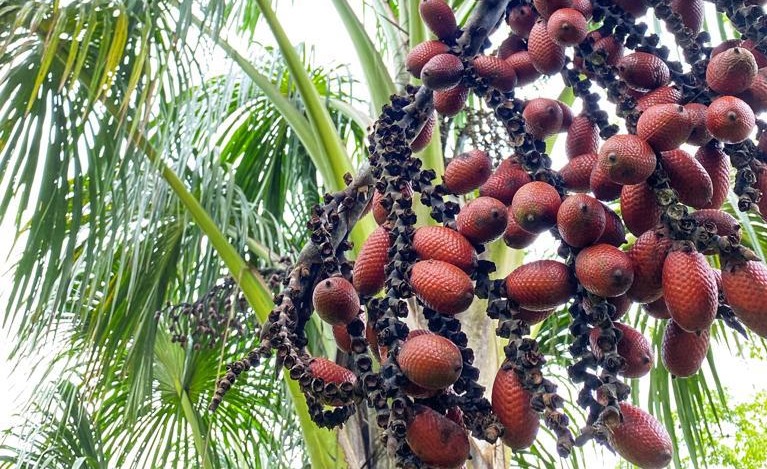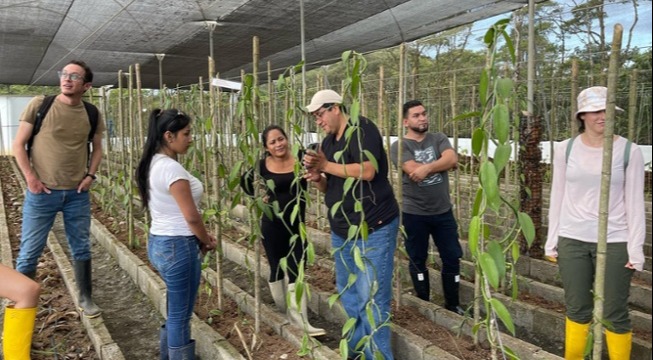Building Sustainable Forest Economies as Alternatives to Oil, Mining, and Logging
-1.jpeg?width=653&height=360&name=339585780_949819743099737_6305647858065474537_n%20(1)-1.jpeg) Shuar people being trained to sustainably cultivate vanilla to generate income as an alternative to oil, mining, and logging industries.
Shuar people being trained to sustainably cultivate vanilla to generate income as an alternative to oil, mining, and logging industries.
Fundación Pachamama’s Forest Economies Program was launched in 2019 and supports bio-entrepreneurship and regeneration projects in the Sacred Headwaters region of the Ecuadorian and Peruvian Amazon.
These innovative projects generate income for communities in the rainforest who might otherwise look for income from the oil, mining, and logging industries trying to infiltrate the region. The program searches for solutions based on sustainable use of forest resources that are also financially viable for community development.
Growing the Forest Economies Program
In 2022, the Forest Economies program supported nearly 40 ventures in natural cosmetics, beverages, processed foods, and handicrafts, providing them with training and marketing spaces.
For the program, it has been a year of growth and learning. Above all, we have seen the potential the bioeconomy has as a sustainable alternative and how it can help to:
- dignify the lives of the Amazonian peoples
- contribute to the eradication of poverty and ending the climate crisis
- and strengthen the economic rights of men and women.
The Chakra Project
The Chakra Project was launched at the beginning of 2022. This project supports entrepreneurship by encouraging rainforest communities to grow financially viable crops in their family food gardens, called chakras in the Achuar language.
Fundación Pachamama has partnered with 65 Indigenous communities in the Ecuadorian Amazon to cultivate and distribute crops such as macambo, cacao silvestre, camu camu, Amazon cinnamon, sangre de drago, ginger, banano, yuca, vanilla, morete, and more.
In October 2022, Chakra Fest was launched as an event that promotes and strengthens new entrepreneurships in the Amazon that have as principles: free of deforestation, fair trade, gender equality, and protection of biodiversity. Within this event, the First Amazon Gastronomic Congress was also launched to promote the consumption of Amazon products, and the protection and conservation of the forest that provides them.
The Chakra Project primarily focuses on the cultivation of two crops: vanilla and morete.
Morete
 Morete is a native palm tree fruit that has not yet been introduced to local markets. It contains more vitamin A than carrots, more vitamin E than avocado, and is rich in protein, fat, and carbs. A deal has been made with a Peruvian beverage company to purchase 50 tons of morete fruit from Indigenous communities to include in a superfruit beverage. Part of the agreement is to leave half of the fruit on the trees so that local birds and monkeys can continue to eat from the trees.
Morete is a native palm tree fruit that has not yet been introduced to local markets. It contains more vitamin A than carrots, more vitamin E than avocado, and is rich in protein, fat, and carbs. A deal has been made with a Peruvian beverage company to purchase 50 tons of morete fruit from Indigenous communities to include in a superfruit beverage. Part of the agreement is to leave half of the fruit on the trees so that local birds and monkeys can continue to eat from the trees.
Vanilla

Vanilla is an orchid native to the Amazon and is still found growing wild in the rainforest. Fundación Pachamama has been exploring vanilla as a potential value chain in the Sacred Headwaters region since 2019. They set up a pilot farm to experiment with different varieties of vanilla to see what would be the best variety to cultivate in Indigenous communities while also being marketable. Now, research is focusing on how to process vanilla beans in the rainforest and how to work with the private sector to have it distributed.
The Future of Forest Economies
Fundación Pachamama and the local Indigenous communities’ aim to grow the size and impact of the Forest Economies program so that it is generating substantial and diverse income throughout the Sacred Headwaters region. Local communities will have the economic security to continue to act as stewards of the forest and the Forest Economies programs will be seen as an important and replicable strategy of forest protection.
Fundación Pachamama plans to build a Forest Economies regional “Hub” where local communities can have access to guidance, training, and management skills for their projects and connect with potential sources of financing.
Training and sharing information is critical for the Forest Economies program to grow and scale in the remote Indigenous territories of the Sacred Headwaters region. The Hub will be like creating a “Chamber of Commerce” for this region. The goal is to have the Hub fully operating by the end of 2024 and growing in reach and impact thereafter.